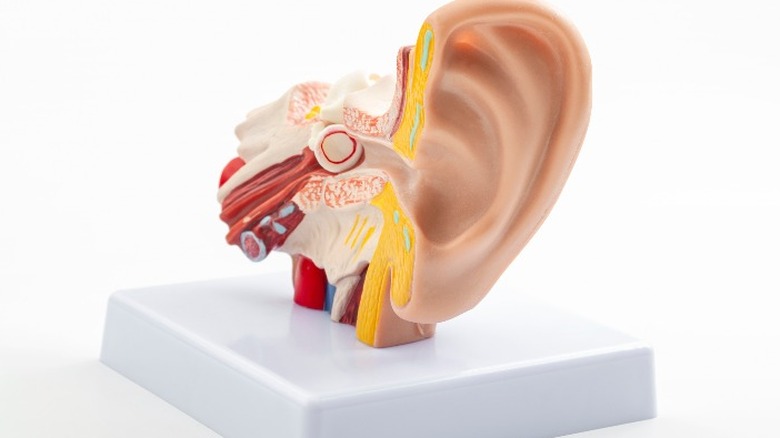You May Have Surfer's Ear If This Happens To You
You have probably heard that spending time in the great outdoors can boost your health. Green spaces, like your local park, can improve your mood (via American Psychological Association) — but did you know that time spent in blue spaces can also improve your mental health?
For people all over the world, the water is a wonderland and gateway to better health. Not only does the beach invoke a child-like nostalgia, but freshwater and ocean activities are also great ways to stay in shape while having fun. However, all of that time in the water can take a toll on your body.
If you frequent cold bodies of water, you may be at risk of developing surfer's ear (not to be confused with swimmer's ear, a bacterial infection in the outer ear canal). According to Healthline, long-term exposure to cold water and wind can cause the growth of a new bone on top of an existing bone in one or both of your ear canals. The result is medically referred to as an "exostosis of the external auditory canal" (via MedicalNewsToday).
Believe it or not, you don't have to be a surfer to get surfer's ear. Other water activities, like diving, kayaking, sailing, and swimming, can put you at risk. According to the Stanford Ear Institute, people who do not come in close contact with cold water can still develop exostoses. Here are the odds of developing exostoses, and what you may or may not feel as a result.
Surfer's ear: statistics, symptoms, and treatment
Water colder than 66 degrees Fahrenheit increases the risk of developing an exostosis (via StatPearls). Men who have surfed for 20 years or more have a 50% chance of developing exostoses, while women who have surfed for 20 years or more have a 42% chance.
Surfer's ear is a tricky condition because people who have it are often asymptomatic (via the Stanford Ear Institute). Because you may not know that you have the condition, you might not seek treatment. However, more serious complications can arise if surfer's ear is left untreated.
If you often develop painful ear infections, it could be a symptom of exostoses (via WebMD). The bone spur can prevent debris — like ear wax or water — from escaping and cause an infection to develop. On a related note, an exostosis can make you feel like your ear is full of debris.
According to MedicalNewsToday, your doctor can remove debris to help manage the symptoms. They may also recommend that you wear earplugs or a neoprene hood to prevent progression. In extreme cases, your doctor may remove the bone surgically (via StatsPearls).


